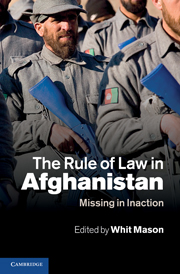Book contents
- Frontmatter
- Contents
- Contributors
- Preface and acknowledgements
- 1 Introduction
- PART I The scope and nature of the problem
- PART II The context
- 4 The international community's failures in Afghanistan
- 5 The rule of law and the weight of politics
- 6 Human security and the rule of law
- PART III The political economy of opium
- PART IV Afghan approaches to security and the rule of law
- PART V International interventions
- PART VI Kandahar
- PART VII Conclusion
- Index
- References
6 - Human security and the rule of law
Afghanistan's experience
Published online by Cambridge University Press: 01 June 2011
- Frontmatter
- Contents
- Contributors
- Preface and acknowledgements
- 1 Introduction
- PART I The scope and nature of the problem
- PART II The context
- 4 The international community's failures in Afghanistan
- 5 The rule of law and the weight of politics
- 6 Human security and the rule of law
- PART III The political economy of opium
- PART IV Afghan approaches to security and the rule of law
- PART V International interventions
- PART VI Kandahar
- PART VII Conclusion
- Index
- References
Summary
The United Nations has learned that the rule of law is not a luxury and that justice is not a side issue. We have seen people lose faith in the peace process when they do not feel safe from crime. We have seen that without a credible machinery to enforce the law and resolve disputes, people resorted to violence and illegal means. And we have seen that elections held when the rule of law is too fragile seldom lead to lasting democratic governance … but one size fits all does not work. Local actors must be involved from the start. The aim is to leave behind strong local institutions when we depart.
This statement by former UN Secretary-General Kofi Anan to the UN General Assembly on 25 September 2005 reflects the now widespread understanding that human security and rule of law are interlinked. Around the world, the physical security of human beings is most endangered in situations in which violations of national and international law are most apparent. If the root causes of all conflicts in the world are examined, we would see that most are associated with or are the result of social injustice, violation of law and abuse of power by rulers. Afghanistan exemplifies this nexus between conflict and the abuse of power. The rule of law, by virtually any account, significantly inhibits the abuse of power.
- Type
- Chapter
- Information
- The Rule of Law in AfghanistanMissing in Inaction, pp. 84 - 96Publisher: Cambridge University PressPrint publication year: 2011



